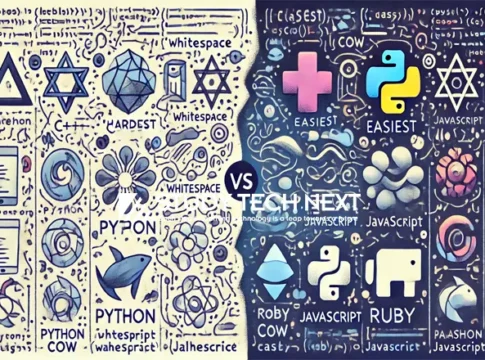Understanding the varying complexities of programming languages can guide learners in selecting the most suitable language for their goals. Here’s an overview of five of the hardest and five of the easiest programming languages to learn:
Five Hardest Programming Languages:
- Malbolge: Designed to be exceptionally difficult, Malbolge’s intricate and obscure syntax makes it nearly impossible to write functional programs, serving more as a challenge than a practical tool.
- Haskell: A purely functional language with a strong emphasis on mathematical concepts, Haskell’s abstract nature and steep learning curve can be daunting for those accustomed to imperative programming paradigms.
- LISP: As one of the oldest programming languages, LISP’s unique syntax, heavy use of parentheses, and unconventional structure present significant challenges to new learners.
- Prolog: Focused on logic programming, Prolog requires a different approach to problem-solving, emphasizing declarative statements over procedural code, which can be difficult for those used to traditional programming methods.
- C++: While powerful and versatile, C++ has a complex syntax and requires meticulous memory management, making it challenging for beginners to master.
Five Easiest Programming Languages:
- Python: Known for its readable and straightforward syntax, Python is widely recommended for beginners and is used in various fields, including web development, data analysis, and artificial intelligence.
- JavaScript: Essential for web development, JavaScript’s forgiving syntax and immediate feedback through browser consoles make it accessible for those new to programming.
- Ruby: Designed with simplicity in mind, Ruby’s clean and readable syntax, along with its supportive community, makes it an excellent choice for beginners interested in web development.
- HTML/CSS: While not programming languages in the traditional sense, HTML and CSS are fundamental for web development, providing a gentle introduction to coding concepts and web page structuring.
- SQL: As a domain-specific language for managing and manipulating databases, SQL’s declarative syntax is relatively easy to grasp, making it a good starting point for those interested in data management.
Selecting a programming language depends on individual goals and the specific applications one intends to develop. Starting with languages that have simpler syntax and strong community support can provide a solid foundation for learning more complex languages in the future.

